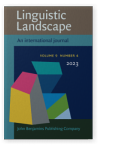Vol. 9:4 (2023) ► pp.357–386
The temporality of commodified landscapes at events & local constructions of identity in Salzburg
This paper presents a study of how temporary, fixed-term local semiotic landscapes in Salzburg, Austria, contribute to a construction of local identity. For this purpose, two main events in the city’s calendar were investigated, the Ruperti fair in the autumn and the Christmas market in the winter. I explore how and the extent to which semiotic resources such as linguistic features index local pride and become commodified, i.e., utilized for economic gain. The indexicality can be temporary or even volatile with some signs and creates an event-specific or non-event specific semiotic ‘register’ (enregisterment). The analysis follows two major commodifying practices, historicizing (in particular, the use of blackletter) and localizing (use of non-standard Austro-Bavarian dialect), and employs a multimodal approach. A qualitative analysis reveals how signs add to the temporary local authentication and discusses how LL research can benefit from capturing event spaces and the temporality of signs.
Article outline
- 1.Introduction: Commodification and local identity in Austria
- 2.On semiotic landscapes at fairs and markets, the temporality of signs, and enregisterment
- 3.Research site(s)
- 3.1The Ruperti fair as a local (and regional) event
- 3.2The Christmas market in Salzburg as an event of international tourism
- 4.Method: Lingscape documentation and database
- 5.Analysis
- 5.1Temporality of multilingualism through tourism and Covid-19-related effects
- 5.2‘Linguistic historicizing’: The (non-)temporality of local heritage
- 5.3‘Linguistic localizing’: The commodification of ‘dialect’ and the volatility of local ‘authenticity’
- 6.Conclusion: The temporal ‘local corporate identity’ and the diachrony of events
- Notes
-
References
